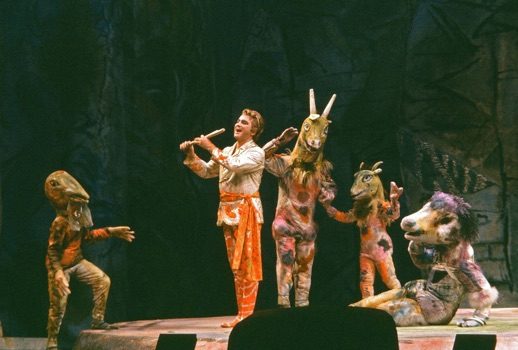

“The animals that come out to dance to Tamino’s flute have walked off of every Chagall canvas we have ever seen.”
On this day in 1967 the Marc Chagall production of Mozart’s Die Zauberflöte was unveiled at the Met. Soprano Lucia Popp made her Met debut as the Queen of the Night.
Alan Rich in the World Journal-Tribune:
By the end of last evening, many members of the Metropolitan Opera House’s audience were convinced that Marc Chagall had not only designed the new production of “The Magic Flute,” but had also composed the music, written the libretto, sung the major roles and conducted. It was decidedly Chagall’s evening, judging from the conversation and from the wild applause that greeted each new stage picture (often to the detriment of the music); seldom has a Met audience come to a performance so visual-minded.
What the painter has provided is certainly worth discussion, to be sure; it may well turn out to be the conversational gambit of the season. He has not so much designed a scenic production of the opera as he has provided a commentary on it. There is no scenery at all, in the usual sense; the action unfolds, rather, against a sumptuous series of Chagall paintings and forms that deal in some general way with mood, and in some even more general way with symbolic significance.
He has not stinted himself. Everything is rich, recognizable, vintage Chagall, the fanciful figures, the slashing, vibrant colors. The animals that come out to dance to Tamino’s flute have walked off of every Chagall canvas we have ever seen. The costumes are Chagall paintings wrapped around people, and they, too, are wildly, vividly colorful.
Reservations, however, must be expressed. One is constantly busy with the settings, simply because they do stand so completely for the man’s viewpoint on the opera. There is a sense, almost, of redundancy, of two “Magic Flutes” simultaneously presented. And sometimes his viewpoints are so personal as to clash with that of any other viewer (and listener). The brilliant reds of the final temple scene are splendid translations of the triumph, but what about the deep mauves of the previous scene? Is that what you and I feel as the Queen of the Night is banished? Possibly not.

























Comments